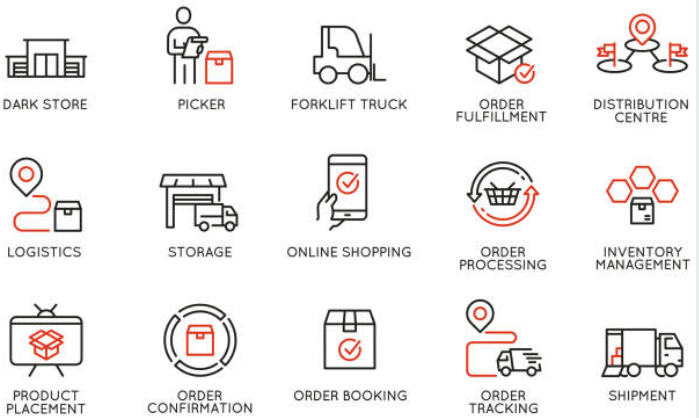Today, an enormous demand is placed on businesses to deliver goods on time and with the ultimate accuracy. Paired with the challenges of multi-channel listing and courier management, it makes Warehouse Management Systems an absolute necessity for companies dealing with warehousing and distribution.
Using a WMS (Warehouse Management System) is crucial for third-party logistics businesses, warehouses, wholesale distributors, and eCommerce retailers to effectively manage their warehouse operations. Warehouse Management Systems help keep track of the inventory flow through distribution centers and manage fulfillment operations, which translates into more efficient processes and considerable cost savings.
Warehouse Management Software comes in four types, and choosing the one that best fits your business needs is vital. In this guide, we’re taking a closer look at Warehouse Management Systems and sharing some useful insights into choosing the right WMS.

What Is Warehouse Management System?
A Warehouse Management System, or WMS, is software that provides real-time data on inventory levels and locations and helps monitor inventory, orders, and deliveries within a warehouse. It also automates a range of tasks associated with warehouse management, such as determining optimal storage layouts.
A WMS can be utilized in some different ways. It can be a standalone application, used by itself or jointly with other tools, or as a part of an ERP system. Besides, a Warehouse Management System can be integrated with an inventory management system or basic transportation management tools.
What Does a WMS Do?
The key features most WMS have boil down to the following:
Inventory Management
Inventory management systems use data collection systems for inventory control, most typically automatic identification data capture (AIDC) bar coding and radio frequency identification (RFID).
Task Management
Warehouse Management Systems enable workflow consolidation, reducing the time and effort needed to complete tasks. A WMS can calculate the most efficient sequence of accomplishing tasks such as replenishment, put-away, cycle counts, and picks.
Product Traceability
Warehouse Management Systems allow monitoring of the location and status of products, including goods/materials receipt, inventory, manufacturing, assembly, packaging, warehousing, shipping, and delivery.
Labor Management
This feature allows warehouse managers to monitor the performance of warehouse workers with the help of KPIs.
Containerization
Containerization enables license plating – grouping and managing inventory in a container – which reduces the number of scans and transactions for tracking items.
Labeling
A WMS with the integrated labeling feature automates the process of labeling, streamlining manual tasks and ensuring compliance with label standards and requirements. In addition, some solutions allow for creating custom labeling.
Types of Warehouse Management Systems
To choose a Warehouse Management System that can best address your unique business needs, it’s imperative to understand what different types of WMS offer. There are four types of warehouse management systems:
- standalone system
- cloud-based system
- integrated with ERP
- supply chain modules
Let’s explore them in more detail.

Standalone WMS
A standalone Warehouse Management System is software stored and run on your premises systems. Standalone systems provide some fundamental warehousing features that facilitate inventory management and warehouse operations. Standalone packages can vary depending on the vendor, still, they typically involve the following functions:
- inventory tracking
- picking and packing
- barcode scanning
- counting product cycles
- shipping management
- returns
Due to its limited functionality, a standalone WMS system is better suited for smaller warehouses. If you plan to scale your business, investing in a more robust WMS is a wise solution.
Cloud-Based WMS
A cloud-based Warehouse Management System is a web-based application that utilizes cloud technology. A cloud-based system offers faster implementation, greater scalability, and enhanced security.
A cloud-based WMS is hosted on an external server and is maintained and supported by an external team. It doesn’t require on-premises installation and integration with your existing warehouse management systems.
Cloud-based systems are renowned for their virtually unlimited flexibility – you can customize your cloud-based WMS as your business grows, adding new features without interrupting your ongoing processes.
Lastly, a private server means enhanced data security protocols, which is critical for businesses handling high-value inventory.
Supply Chain Module
While most warehouse management solutions assist in handling warehouse-related tasks, supply chain management software covers a broader scope of functions.
As its name suggests, a supply chain management system assists in managing supply chain operations. Although it primarily focuses on automating routine tasks such as inventory management and sourcing of materials, it can also replace a great deal of manual work associated with:
- risk analysis
- ongoing business processes
- relations with vendors
- customer service
- transportation management
ERP Module
The enterprise resource planning (ERP) software is designed to collect, store, and process data from different departments within a business. This typically includes information on manufacturing, inventory management, marketing, eCommerce, sales, customer relations, shipping, etc. The ERP is especially valuable since it has extensive financial reporting capabilities allowing you to invoice, bill, track, and more.
While integrated ERP systems include warehouse management features, they go far beyond that, which makes them a perfect solution for centralizing all operations into a single interface.

Benefits of Warehouse Management System
Warehouse Management Systems go a long way toward helping organizations to solve major challenges they struggle with these days. From ineffective inventory management to poor customer service, a WMS can save the day by providing a viable solution to eliminate any issues related to the supply chain. Warehouse Management Systems are associated with some substantial benefits they can bring to businesses.
Advanced Inventory Management
A WMS gives you total control over your inventory, from receiving to shipping. Otherwise, you risk carrying too much stock or running out of stock, which both have adverse effects – decreased cash flow and backorders. A robust WMS can greatly enhance your inventory management, creating a faster inventory turnover.
Enhanced Customer Service
Warehouse management systems give companies access to data that helps them obtain valuable insights and create more personalized customer experiences. In addition, automating processes from order to delivery makes it easy to check product availability. It provides customers with more realistic delivery dates, which means fewer customer complaints, more favorable customer feedback, and enhanced customer service in general.
Higher Productivity
Outdated processes can make warehousing operations slow and inefficient. On the other hand, modern technologies such as Warehouse Management Systems help to considerably increase efficiency and productivity by automating routine tasks and minimizing errors.
Substantial Time Savings
Without any doubt, labor management is quite time-consuming if performed manually. WMS software helps significantly cut down this time. For instance, when orders come in, a WMS automatically allocates them, with no need for manual approval.
Or, thanks to using barcodes for tracking packages in transit, companies spend less time on customer service – customers automatically receive regular updates on their packages.
Optimized Warehouse Space
Utilizing your storage space effectively is crucial for successful warehouse operations. Optimizing your space allows you to store more significant amounts of items and keep goods that are about to be shipped closer to the shipping area.
A WMS helps locate items in relation to sell-by date, packing and shipping points, which means the ultimate efficiency of using warehouse space.
Lower Stock Inventory Costs
A lack of transparency within supply chain processes can lead to inefficiency and increased costs. Warehouse Management Systems provide real-time data that can be fully integrated with other systems, including Customer Relationship Management.
This data is a goldmine of insights into consumer trends, challenges, and opportunities, for example, spotting long delays from particular manufacturers or growing seasonal demand from a specific group of customers. Having such information up your sleeve and acting accordingly helps you meet customer demands while keeping costs tight.
Reduced Warehouse Staff
A Warehouse Management System offers increased warehouse efficiency by automating a range of operations, resulting in fewer workers needed to complete tasks. Moreover, this benefit comes with close to zero error rates and lower training costs.
Faster Fulfillment of Orders
Today, offering next-day delivery means having a decided competitive edge. A WMS can accelerate the order transmission speed by utilizing mobile barcode scanners.

How To Choose the Best Warehouse Management System
How to choose a WMS that can best meet your business needs? Here are some aspects to consider.
Functionality
Look for a Warehouse Management System with broad functionality that can maximize your performance while minimizing manual work. Plus, ensure your WMS software can accurately measure data to streamline the tracking process.
User-Friendliness
The easier a Warehouse Management System is to use, the less time it requires to train warehouse personnel. Good WMS applications have a convenient user interface and provide smooth navigation.
It’s also especially helpful when the system allows for streamlined data entry and creating template reports and charts. Last but not least, consider a system with an easy-to-access dashboard displaying critical data and automatically updating it in real-time.
End-to-End Transaction Management
To effectively monitor the entire supply chain from receiving to shipping, you’ll need a system that can track:
- receipt
- putting received items away
- shipping
- order picking
- inventory audits
- item movement
Scalability
If you plan for growth, make sure your WMS solution is scalable and able to adapt to growing requirements. A distinct sign indicating that the Warehouse Management System is scalable is its ability to integrate with most ERPs. The thing is that businesses are likely to switch to more robust ERP systems as they get bigger, and it would be inefficient to change the WMS every time you move to a new ERP.
Multi-Channel Fulfillment Services
Multi-channel fulfillment services allow you to track inventory while handling orders across multiple warehouses, so consider looking for this feature when choosing your WMS software.
Compatibility with Your Enterprise Systems
Your Warehouse Management System should be compatible with your label printers, scales,
barcode readers, and other equipment. If you’ve decided on a standalone solution, make sure your on-premise systems can technically handle it.
Easy-To-Interpret Metrics
Having plenty of insightful data at hand is great, still, make sure the metrics your WMS provides are easy to understand so that you can fully leverage them. Your software should allow you to create accurate and easy-to-understand reports on warehouse operations.
Smooth Integration with ERP
If you’re already using an ERP, make sure that the WMS you consider is compatible with it. And provided you plan to integrate your Warehouse Management System with an ERP in the future, it’s imperative to get one that can seamlessly pair with ERP systems.
Final Thoughts
At the end of the day, a warehouse management system is a must-have tool for businesses that strive to offer value-added services. It helps ensure that the right product is at the right place at the right time while automating many tasks and cutting down on errors. WMS solutions enable businesses to make the most of their labor, space, and equipment, effectively supporting the needs of the global supply chain.







